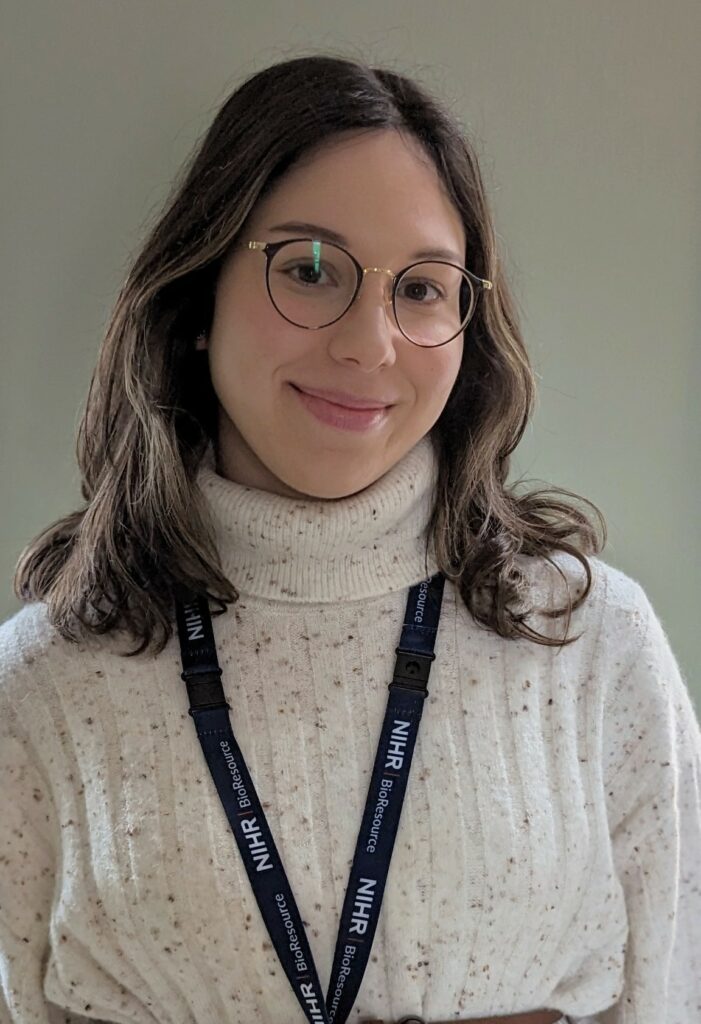Celebrating women’s achievements for International Women’s Day: Sabine’s story
March 8th is International Women’s Day (IWD). And for Senior Study Coordinator Sabine Hein, that means recognising the hard work that women from all over the world, and from all backgrounds, do and achieve in all aspects of their lives. “As a female scientist but also as a mum-to be,” Sabine says, “I feel like opportunities in science and research for women have improved for the best.”

Sabine Hein, Senior Study Coordinator
Working on hundreds of studies gives you a real insight on how effective research can be.
Sabine explains how rewarding working in research is and why any achievement to improve healthcare should always be celebrated.
Sabine, what does a role as study coordinator involve?
I oversee research studies supported by the National Institute for Health and Care Research (NIHR) BioResource, it’s a varied role covering a wide range of activities. These include recruiting participants into health research studies, working with researchers to ensure we meet their study needs, reviewing study application forms, and managing participant documentation to make sure the data is consistent and correct.
What kinds of research studies are you working on?
The NIHR BioResource supports a wide range of different studies looking at different disease outcomes. I have worked on a number of different projects but more notably I have worked on our COVID-19 studies.
Since the start of the pandemic we’ve recruited more than 8,000 people into our COVID BioResource and supported over 50 studies. Our COVID studies have been hugely varied and looked at everything from investigating the disease mechanism, understanding how our immune systems respond to covid vaccines, and researching the neurological complications of covid infection, to name a few!
Alongside our COVID cohort we also have our rare disease, common diseases and healthy population cohort. Ultimately, we are so lucky to have the resources and capacity to support research looking at such a wide range of disease outcomes.
What made you want to work in research?
I have always been interested in health and understanding ways of improving health, not just on a personal level but also to improve the health outcomes of the wider population. I’m proud to have worked on studies where the work has contributed towards some amazing findings and publications which have made a real improvement to human health. When working in research you will always be faced with lots of challenges but also lots of victories, such as meeting your recruitment target in time or completing a big piece of data work. No matter how big or small, these are all very important achievements that should be celebrated.
Why do you think International Women’s Day is important?
We need to recognise the hard work that women from all over the world, and from all backgrounds, do and achieve in every aspect of their lives, not just in their career.
As a female scientist but also as a mum-to be, I feel that opportunities in science and research for women have improved for the best. There is so much more support available in the workplace now, whether it’s flexible working, or recognising what a healthy work-life balance is. These are all very positive initiatives, whether you have a family or not.
Why is it important for more women to work in research?
It’s vital. [It’s been shown] that workplaces with a diverse range of gender, age and backgrounds are more successful, as you are able to incorporate lots of different types of thinking, which can result in better problem-solving and innovative ideas!
What advice would you give someone who wanted to have a career in research?
There are so many different ways that you can get involved in research, whether it’s recruiting volunteers for studies, working with data, in the lab, or as a research nurse. There are also so many different types of research available and the skills gained is certainly transferable.
Before working at the NIHR BioResource I used to work in human nutrition research, and I feel that coming from a different field of science can often be helpful because you can bring new and valuable insights. The most important thing is to challenge yourself, even if you think you don’t have the previous experience to work in a particular research role, because you never know where those new opportunities can take you.
About NIHR BioResource
If you would like to know more about the NIHR BioResource or would like to sign up as a volunteer, find out more details on their website.


